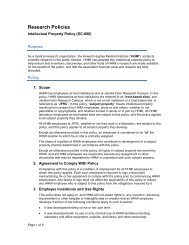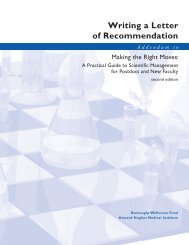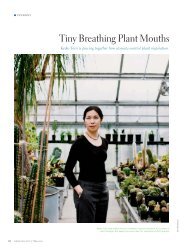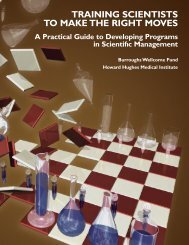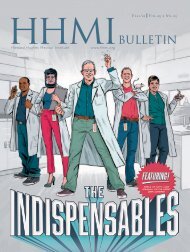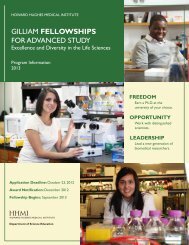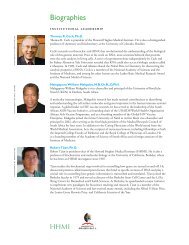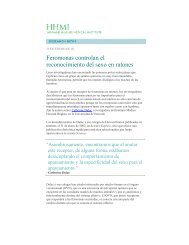Download PDF - Howard Hughes Medical Institute
Download PDF - Howard Hughes Medical Institute
Download PDF - Howard Hughes Medical Institute
Create successful ePaper yourself
Turn your PDF publications into a flip-book with our unique Google optimized e-Paper software.
International Early Career Awards<br />
Provide Connections and Funding<br />
“BACK IN SCHOOL, I ALWAYS HEARD THAT IF YOU WANTED TO DO<br />
research you would probably have to go work in other parts of the<br />
world,” says Miguel Godinho Ferreira, a researcher at the Gulbenkian<br />
Science <strong>Institute</strong> in Portugal. “Being able to prove that advice<br />
wrong gives me enormous pleasure.”<br />
Godinho Ferreira is one of 28 scientists from 12 countries who<br />
were selected to receive HHMI’s inaugural International Early<br />
Career Scientist (IECS) awards. “These are the people who,<br />
10 years from now, we expect will be the scientific leaders in their<br />
countries,” says HHMI President Robert Tjian.<br />
These researchers—who have all run their own labs for less than<br />
seven years—will be integrated into HHMI’s scientific community,<br />
attending meetings and giving talks to the <strong>Institute</strong>’s U.S.-based<br />
investigators and early career scientists.<br />
“This program is about building connections internationally,”<br />
says Edwin W. McCleskey, a scientific officer at HHMI who helps<br />
run the IECS program. “We have chosen talented people who we<br />
feel can build connections with our scientists.”<br />
The IECS program is the latest incarnation of HHMI’s international<br />
grants to individual researchers. When it came time to<br />
rethink those grants, Tjian and Jack E. Dixon, HHMI’s vice president<br />
and chief scientific officer, wanted to design a program that<br />
provided support for early career scientists who would benefit most<br />
from a financial boost and the connection with HHMI’s scientific<br />
community. The research arena for early career scientists can be<br />
challenging internationally. For example, funding to help new scientists<br />
start up their labs can be quite variable, and often much less<br />
money is available than in the United States.<br />
Scientists from 18 countries were eligible to apply for the awards<br />
and HHMI received 760 applications. A rigorous peer review process<br />
narrowed the field to 55 semifinalists from 14 countries.<br />
As part of the review process, the semifinalists gave a 15-minute<br />
scientific presentation at a symposium in November at HHMI’s<br />
Janelia Farm Research Campus, in Ashburn, Virginia.<br />
“The major criterion was really scientific excellence: what have<br />
they accomplished in their young careers; what kind of potential did<br />
they have; could they explain their science in a clear way,” Dixon says.<br />
Most of the awardees come from China, Portugal, and Spain, but<br />
recipients are also based in nine other countries: Argentina, Brazil,<br />
Chile, Hungary, India, Italy, Poland, South Africa, and South Korea.<br />
Nine of the 28 (32 percent) are women. Each International Early<br />
Career Scientist will receive $650,000: $100,000 a year for five years,<br />
plus a $150,000 award in the first year for major equipment purchases.<br />
Godinho Ferreira plans to use his award to gain insights into the<br />
mechanisms that cause and direct aging—insights that might lead<br />
to solutions for age-related ailments such as cancer and cardiovascular<br />
disease.<br />
FOR MORE INFORMATION: To learn more about the scientists and their work, visit<br />
www.hhmi.org/iecs20120124.<br />
NEW INTERNATIONAL SCIENTISTS<br />
ANDRÉ BÁFICA<br />
Federal University of Santa Catarina<br />
Florianópolis, Brazil<br />
MEGAN R. CAREY<br />
The Champalimaud Center<br />
for the Unknown<br />
Lisbon, Portugal<br />
PEDRO CARVALHO<br />
Center for Genomic Regulation<br />
Barcelona, Spain<br />
RUI M. COSTA<br />
The Champalimaud Center<br />
for the Unknown<br />
Lisbon, Portugal<br />
LUÍSA M. FIGUEIREDO<br />
<strong>Institute</strong> of Molecular Medicine<br />
Lisbon, Portugal<br />
JOSÉ L. GARCÍA-PÉREZ<br />
Pfizer—University of Granada—<br />
Junta de Andalucía Center for Genomics<br />
and Oncological Research<br />
Granada, Spain<br />
RODRIGO A. GUTIÉRREZ<br />
Pontifical Catholic University of Chile<br />
Santiago, Chile<br />
JUNJIE HU<br />
Nankai University<br />
Tianjin, China<br />
SIMÓN MÉNDEZ-FERRER<br />
National Center for Cardiovascular<br />
Research<br />
Madrid, Spain<br />
THUMBI NDUNG’U<br />
University of KwaZulu-Natal<br />
Durban, South Africa<br />
MARCIN NOWOTNY<br />
International <strong>Institute</strong> of Molecular<br />
and Cell Biology<br />
Warsaw, Poland<br />
DONG-CHAN OH<br />
Seoul National University<br />
Seoul, South Korea<br />
CHUN TANG<br />
Wuhan <strong>Institute</strong> of Physics and<br />
Mathematics-Chinese Academy of Sciences<br />
Wuhan, China<br />
ROSELLA VISINTIN<br />
European <strong>Institute</strong> Foundation<br />
of Oncology<br />
Milan, Italy<br />
XIAOCHEN WANG<br />
National <strong>Institute</strong> of Biological Sciences<br />
Beijing, China<br />
KARINA B. XAVIER<br />
Gulbenkian Science <strong>Institute</strong><br />
Oeiras, Portugal<br />
LÁSZLÓ CSANÁDY<br />
Semmelweis University of Medicine<br />
Budapest, Hungary<br />
BAVESH D. KANA<br />
University of the Witwatersrand<br />
Johannesburg, South Africa<br />
GABRIELA C. PAGNUSSAT<br />
National University of Mar Del Plata<br />
Mar del Plata, Argentina<br />
NIENG YAN<br />
Tsinghua University<br />
Beijing, China<br />
ÓSCAR FERNÁNDEZ-CAPETILLO<br />
Spanish National Cancer Research<br />
Center<br />
Madrid, Spain<br />
MIGUEL GODINHO FERREIRA<br />
Gulbenkian Science <strong>Institute</strong><br />
Oeiras, Portugal<br />
FYODOR KONDRASHOV<br />
Center for Genomic Regulation<br />
Barcelona, Spain<br />
SANDHYA P. KOUSHIKA<br />
National Center for Biological Sciences<br />
Bangalore, India<br />
FENG SHAO<br />
National <strong>Institute</strong> of Biological Sciences<br />
Beijing, China<br />
ROCÍO SOTILLO<br />
European Molecular Biology Laboratory<br />
Monterotondo, Italy<br />
HONG ZHANG<br />
National <strong>Institute</strong> of Biological Sciences<br />
Beijing, China<br />
BING ZHU<br />
National <strong>Institute</strong> of Biological Sciences<br />
Beijing, China<br />
February 2o12 | HHMI BULLETIN<br />
41




